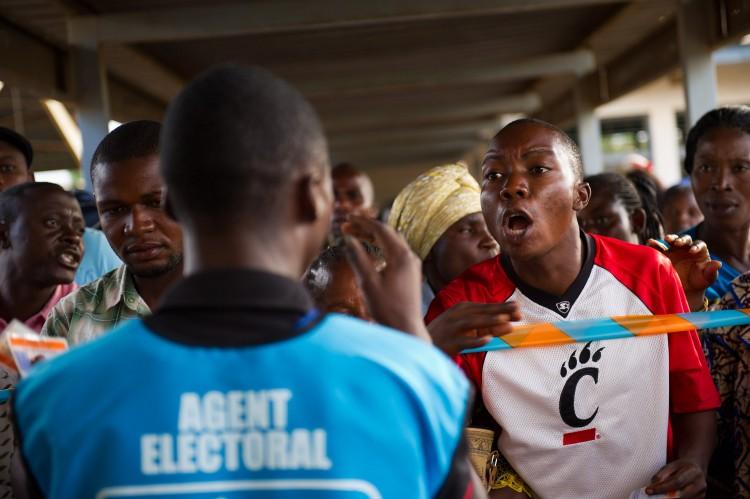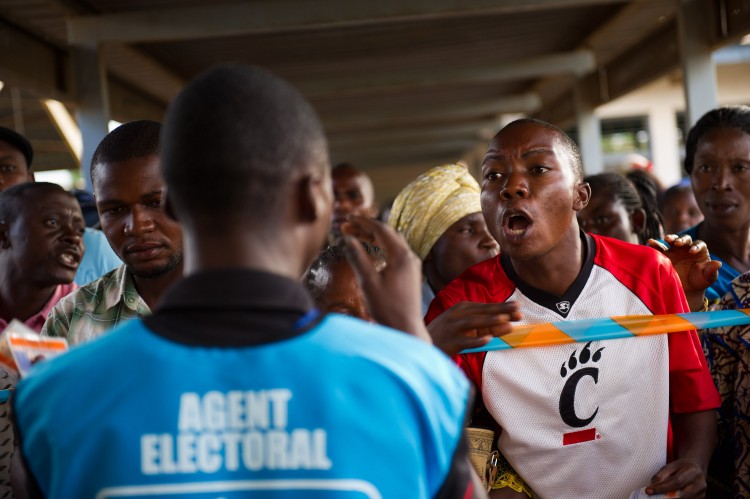Recent elections in the Democratic Republic of the Congo (DRC) played out in an all too familiar fashion for Africa: accusations of electoral fraud, violence, and contested results with the loser in this case, also declaring himself president, replaying the drawn out saga on in the Ivory Coast last year.
In many countries of sub-Saharan Africa, democracy is little more than a show for the people or perhaps for the world, without a genuine investment in its underlying principles. And while democracy appears to be acknowledged as the best route to peace and stability, the challenges to create it are still formidable.
By and large, democratic reforms were instigated by Western donors in exchange for aid dollars. The process dates back to a 1989 World Bank Report, “Sub-Saharan Africa: From Crisis to Sustainable Growth,” which “for the first time linked aid flows to what it called ‘governance’,” according to a 2003 report by Njunga M. Mulikita as vice chair of the board of the Southern African Centre for the Constructive Resolution of Disputes. Good governance included things like multiparty systems, political freedoms, an active civil society, rule of law, and transparency in decision making.
Nations ruled by dictators were urged to transform into democracies with constitutions, human rights, and multiparty electoral systems overnight.
So Africa embraced democracy. However, democracy was only implemented in a cosmetic way, being used as a means to an end: keeping power and securing aid. The definition of democracy came to be manipulated and abused by those wanting to gain and retain power.
Twenty years later, changes are meager. Since elections in the DRC last November (the country’s second democratic vote) incumbent Joseph Kabila has kept his grip on power, even though many observers said the elections were manipulated and deeply flawed.
According to experts, Kabila deliberately sabotaged the electoral process by establishing the electoral commission only nine months before the vote, creating chaos at polling stations. Some never opened.
Similarly in Cameroon last October, incumbent President Paul Biya booked all available airplanes flying to the north of the country, effectively barring his opponents from conducting election campaigns. Biya thus secured his sixth consecutive mandate.
“Democracy is used as a minimalist foundation to try to legitimize one’s rule through the ballot box, even though that rule or that election could be illegitimate,” says Sanusha Naidu, independent political analyst, by phone from Cape Town, South Africa.
In another recent high-profile example in Ivory Coast, despite challenger Alassane Ouattara being declared the winner by United Nations invigilators, he could not take office because longtime dictator President Laurent Gbagbo refused to hand over power. A prolonged and violent standoff ensued until Gbagbo was cornered and arrested, with the help of French forces. He now faces charges at the International Criminal Court related to the postelection bloodshed.
Because of international intervention, however, it never became clear who the real “spoiler” of the elections in Ivory Coast was. Western media sided with Ouatara and portrayed Gbagbo as the spoiler, despite serious concerns about the legitimacy of Ouattara’s campaign discussed inside the African Union.
In DRC, the fraud was so rampant that it is also questionable who spoiled the democratic process, the formal winner Joseph Kabila or his historical opponent Etienne Tshesekedi who disputed the result.
“DRC and Ivory Coast are both instances of a broader trend in Africa generally of key electoral figures ’spoiling' the postelection period for personal advantage regardless of the actual results,” wrote Grant Masterson, a senior program officer at the Electoral Institute for the Sustainability of Democracy in Africa (EISA) in Johannesburg, via email.
According to observers, it has been getting harder to hold elections whose results are accepted by everybody, with one main reason being that democratic structures actually encourages ethnic and other divisions, that are already abundant.
According to Irish author Christopher Ruane, in countries where there are serious ethnic, religious, or cultural fault lines, the democratic approach opens up the door for a systematic abuse of rights by the majority group.
This was the reason given by Uganda’s President Museveni for his “no-party democracy.” Museveni argues that party-based democracy in the short-term would degenerate into ethnically homogenous parties fighting elections on ethnically divisive grounds.
Another example can be seen in Africa’s newest country, South Sudan that was born after years of bloody civil war. Many tribes in South Sudan do not acknowledge the legitimacy of the ruling Sudan People’s Liberation Movement. This explains the high mistrust between political parties.
“They do not feel like partners, like players in the same stadium; they feel like enemies because in the recent past they were part of different rebel groups, fighting between each other. And they transport these things on the political arena,” says Vincent Tohbi, EISA country director in DRC.
African states have had a hard time establishing strong governance. The populace generally mistrusts the state and its electoral system because of biased laws and partisan electoral commissions.
Most politicians lack basic knowledge of what good governance means, which also contributes to the mistrust of institutions.
“You will find many people who have no idea about running a government,” said Tohbi.
Moreover, politicians are not seen as entering politics out of a commitment to the people, they’re seen as wanting to satisfy their own political and financial interests. In many countries with a limited private sector, the state is the only real source of income.
Next ... Given Time
Given Time
According to Tohbi, African experience shows that it takes at least three or four elections to establish a more stable democracy.
In the Economist Democracy Index 2011, of the 44 African countries ranked, only one was considered a “full democracy,” the Indian Ocean island of Mauritius, which adopted democratic reforms in 1968.
One step down, were “flawed democracies,” which included South Africa, Cape Verde, Botswana, Namibia, Lesotho, Ghana, Mali, Benin, and as of 2011, Zambia. Most, but not all of these countries have had multiple rounds of multiparty elections. Nonetheless, 23 of the world’s 53 dictatorships are in sub-Saharan Africa.
Still, there is room for optimism. Unlike the world’s long-established democracies that date back hundreds of years, most African countries have existed but 50 years. Moreover, Africa is currently seeing unprecedented economic growth and showing great potential. So the time is ripe for catching up.
And with the Arab Spring echoing from across Sahara, Africans too are looking political and social change.
“Ordinary citizens are taking power back to themselves,” said Ebrahim Fakir, EISA manager of Governance Institutions & Processes, from Johannesburg.
The “walk to work” protests in Uganda last April, the mass opposition rallies in Gabon in January 2011, and varying in scale, uprisings in Ivory Coast, Nigeria, Congo, and Sudan, show that citizen participation in political affairs is on the rise.







